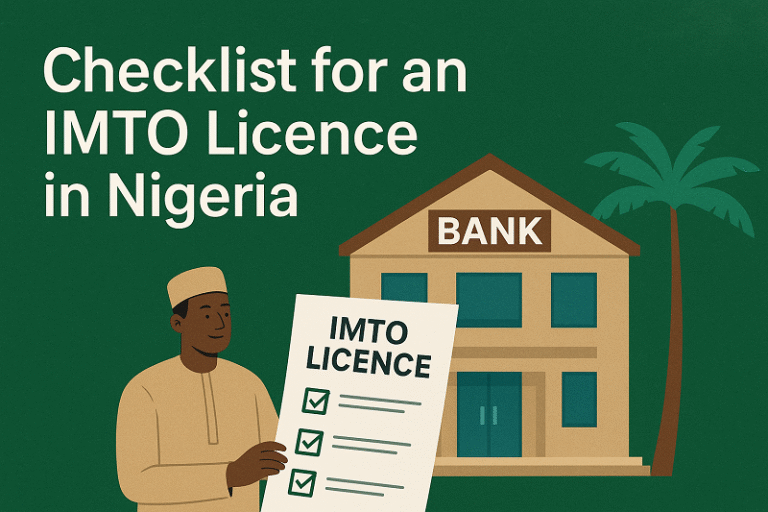Need an IMTO (International Money Transfer Operator’s) Licence? And How to Apply? Our checklist guides you through the application process.
Step 1: Check If Your Business Needs an IMTO Licence
- Are you facilitating inbound international money transfers into Nigeria? Cross-border remittances into Nigeria need an IMTO licence. Our additional IMTO licence regime resources may be helpful.
- Are you a bank or fintech company? Banks and fintech cannot operate as IMTOs – they may only serve as agents.
- For outbound transfers or other financial services? Licensed IMTOs may not carry out outbound remittances or unrelated services.
Step 2: Prepare for Application
Financial Requirements:
- Non-refundable application fee: ₦10 million.
- Minimum share capital: Foreign IMTOs: USD 1 million. Nigerian IMTOs: Naira is equivalent to USD 1 million.
Required Documents:
- Approval to operate in other jurisdictions (if applicable).
- CAC incorporation documents and tax clearance.
- Ownership and beneficial ownership structure.
- Board approval and company profile, including profiles of management.
- Credit bureau reports for key officers.
Step 3: Application Stages
- Apply for Approval-in-Principle (AIP) to the CBN’s Director, Trade & Exchange Department, with complete documentation.
- Within 3 months of receiving AIP, submit additional operational requirements, including:
- Contracts with Authorised Dealer Banks (DMBs)
- Business plan with internal controls, risk management, IT policy, consumer protection, transaction flows
- Enterprise risk management, continuity/disaster recovery plans
- Draft agreements with foreign partners (if applicable)
Step 4: After Licensing & Compliance
- Annual renewal (by January 31): ₦10 million renewal fee. Missing this may lead to agent DMBs stopping business.
- AML/CFT/CPF compliance: Must align with CBN’s latest anti-money laundering and terrorism financing frameworks.
- Agent supervision: Appoint agents under a formal agreement – IMTO remains liable for agent conduct. Notify CBN of agents and maintain separate settlement accounts for customer funds.
- Transaction records & reporting:
- Maintain systems and records for audits.
- Submit daily, weekly, and monthly reports and suspicious transaction reports (STRs) within 24 hours.
- Full disclosure: Inform customers of exchange rates and fees, and that IMTOs do not take deposits or lend money.
Summary Table
| Step | Action |
| 1. Assessment | Determine if your activity requires IMTO licence (inbound remittances) |
| 2. Preparation | Gather documents and meet financial thresholds (₦10M fee, USD 1M capital) |
| 3. AIP Application | Submit for Approval in Principle to CBN |
| 4. Final Licence | Provide detailed operational documents within 3 months post-AIP |
| 5. Post-Licence | Renew annually, ensure AML compliance, manage agents, maintain reports |
Due to the complexity of the IMTO licence application process, you consider engaging a reputable fintech law firm to assist in managing all the stakeholders and the Central Bank of Nigeria.
Pin it down: Need help applying for the IMTO Licence in Nigeria? Reach out to a fintech lawyer. At SRJ Legal, we focus on fintech and online banking law.
We complement our fintech and online banking practice with education law and commercial litigation (dispute). At the same time, we provide corporate counsel services to businesses and individuals, including families.

